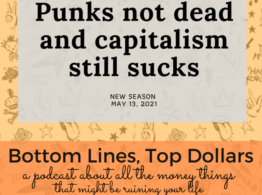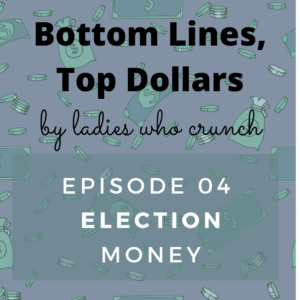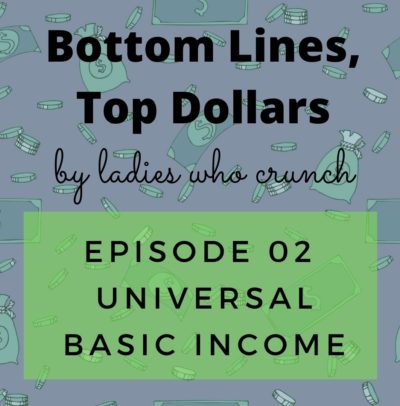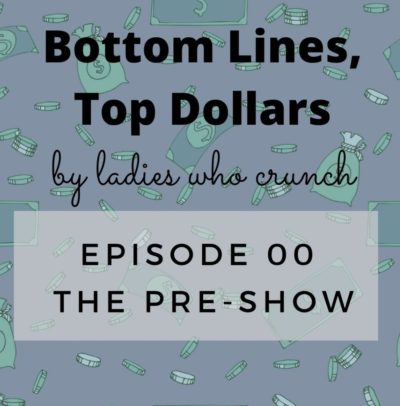Season Two:
Punks not dead and
capitalism still sucks
13
May 2021
Origin Stories: From Queer Punk Anti-capitalist Outsiders to Finance Insiders?!
8:00pm
Venue, City, State
20
May 2021
Our Tragic Minimum Wage Jobs and the More Tragic History of Minimum Wage
8:00pm
Venue, City, State
27
May 2021
Debt Cancellation and Exploring the Ethics of Debt
8:00pm
Venue, City, State
3
June 2021
The Trick to Figuring Out “Your Worth” in the Market When That Phrase Makes No Damn Sense To You
8:00pm
Venue, City, State

- Recorded Winter 2021
- Releasing May – July 2021
- Listen here
- Support the show on our patreon here
About the second season
Bottom Lines Top Dollars second season explores the question: how did 90s and 2000’s punk intersect with money, and what can that teach us today? What if you don’t “Live fast die young,” but have to meet needs over the course of your life instead?
Listeners will hear stories — from “the punkest way I ever made money,” to “the worst minimum wage job I ever had,” to “magic bullshit I did to try to avoid working” — as well as learn facts about how the financial systems around us operate.
The show is written and produced by the Ladies Who Crunch: Queer femme artist/organizers turned financial professionals Laura and Hadassah, who explore the alternative ways of being that crafted the bedrock of who they are today to understand what they learned – and had to unlearn – from punk in order to figure out their money lives and to understand financial systems.
SEASON 1
The first season of Bottom Lines Top Dollars is eleven episodes, and was released each Wednesday from Oct 14 – Dec 23 2020.
Mutual Aid, Gift Economies and What Comes After the Pandemic [link]
In our final episode of Season 1, we take a hot minute to reflect on the year that was 2020 and what it might mean for our future. Specifically, we dig into the massive wave of grassroots and hyper-local mutual aid responses to the COVID19 crisis and how these events are both tied to a deep and rich history but also potentially to a better future. We discuss how disasters and moments of crisis can create turning points of change, and how that change grows upward from community responses rather than coming from the top down. We connect this back to tensions we see escalating between pro-democratic movements and the continuing rise of fascism backed by racism and mythological calls to go backward into a past that (actually) never existed. Throughout this episode we ask ourselves and listeners to both reflect on what we all just endured together and dream about how we can collectively respond to what is coming, potentially moving away from hyper-individualistic and competitive economies towards economies that are more caring and sustainable, based on gifting and relationship building.
–
Listener Mail: Tax Tips for the Self-Employed, Book Recommendations & Money Psychics! [link]
n this episode the Ladies Who Crunch open up the mail bag and answer questions sent by listeners! This episode includes:
Some great end-of-year tax tips for those who are self-employed (aka “sole proprietors”)
A dive deep into the murky world of tax write offs and how they are both legit and necessary for anyone running a business and also ripe for abuse by those with the means to get away with it.
A list of book recommendations about envisioning post-capitalist worlds, alternative ways of exchange, eco-activist personal finance theories, debt forgiveness and revolutionary histories.
Psychics!
If you have questions, don’t hesitate to get in touch! We plan to make Listener Mail a staple of every season 🙂 We have also received some great ideas from listeners for entire episodes. We are currently planning season 2 so if you have anything you want us to include, get in touch!!!
Is there such a thing as ethical investing? [link]
In this week’s episode of Bottom Lines Top Dollars we discuss a question that many punks, weirdos, leftists, environmentalists and anti-capitalists ask themselves when they become financially stable: what do I do with my extra money? Investing your excess cash is an important way to save towards retirement, but can it be done ethically? Is it possible to grow your savings without contributing to bad things in the world (massive carbon emissions, pollution, unfair and exploitative labour practices, etc). Concerns about the ethical implications of investing your money can sometimes keep people from taking action for their own futures. In this episode we discuss all of this and some strategies you can use to feel better about what you do with your savings.
If any of these questions interest you, then you should listen to this episode: Why does investing our money scare us? What is investing and how do you do it? What are stocks and bonds and how do they make you money? What are RRSPs, IRAs, 401ks? Is investing inherently unethical? If you think of yourself as an anti-capitalist, does your participation in profit from property make complicit in all kinds of horrible shit? If you do decide to invest your money, is there a way to do so ethically? Can you use your investment money for good? To invest in green companies or push for positive change? What are impact funds or ESG funds? What is values-based investing? How do you evaluate an investment firm to know whether their funds actually meet your ethical standards? How much time and effort is required to actually invest ethically? Is it a realistic goal for the average person?
—-
The Ladies Who Crunch are Hadassah Damien and Laura Boo. More information about us and this podcast can be found at ladieswhocrunch.club.
Please follow us on Instagram (@bottomlinestopdollars) and if you want to send us questions or episode ideas, email us at bottomlinestopdollars@gmail.com.
Special thanks to our researchers Ariel Federow and Handy Levine.
—-
CLIMATE NIHILISM [link]

The climate crisis is here and it is scary as hell. So scary that it is tempting to close your eyes (and maybe even scroll past this episode). But please don’t do that. Instead, let the Ladies Who Crunch walk you through where those feelings of climate despair, grief and nihilism come from, strategies for facing them (surprisingly similar to strategies for facing down your personal finance fears) and concrete actions you can take to use your personal economic power to fight climate change.
Questions we ask in this episode include: What is climate nihilism and how does it keep us from taking action? Why does climate change make us feel hopeless? How is this similar to how we feel about our personal finances? What are some strategies for combating nihilism or hopelessness? How much time do we have to act and what kind of impacts are we likely to feel if we don’t act now? Who are the major emitters of greenhouse gases? Do your personal consumer choices actually make a difference? What are some political and economic actions you can take to address climate change? How can you leverage your purchasing power to hit carbon emission reduction goals?
—
The Ladies Who Crunch are Hadassah Damien and Laura Boo. More information about us and this podcast can be found at ladieswhocrunch.club.
Special thanks to our researchers Ariel Federow and Handy Levine.
REPARATIONS [ LINK]
The Black Lives movement and other grassroots movements for racial justice have worked tireless to push the issue of reparations for descendants of enslaved people into the spotlight of American politics. In the last year the issue has been hotly debated with some insisting on their necessity and others disqualifying them as impractical or impossible. In most instances when politicians or others don’t support reparations, it is for issues of economic impracticality. And this is where the Ladies Who Crunch step into the debate.
In this episode we ask: What are reparations? What is their purpose and goal? How do they come to be enacted? How do we measure or value reparations? Is it better to measure the original harm or the outcome of that harm? What possible forms can reparations take, both monetary and non-monetary? How have reparations been valued and implemented in the past? Must reparations include direct cash payments or can they be entirely composed of in-kind or non-monetary elements such as land, educational programs, employment opportunities, commemorative projects and political representation? How can the government fund reparations? What kind of economic challenges do we face when figuring out how to fund and implement reparations on a nation-state level? Are there other levels at which reparations can occur? Are “individual” or “inter-personal” reparations groups online really engaged in a reparations project or is it something else? Is backlash (race or class war) an inevitable externality of reparations like “The Watchmen” envisioned or can the financial composition of reparations avoid this outcome? Can we truly repair harm through reparations? Can capitalism ever truly address the historical harms of war, colonialism, genocide and other forms of systemic violence?
From inflation to baby bonds and modern monetary theory to programs to tax profiteers, this episode of Bottom Lines Top Dollars digs deep into the money issues of reparations so that you can engage meaningfully with anyone who tries to end the debate at “that’s not economically viable”.
We try to hit as many points as we can, but we know what we could always go deeper or say more. If you have more questions or want us to come back and address any specific issues discussed in this podcast in more detail, please let us know! Email us at bottomlinestopdollars@gmail.com or find us on FB, IG or Twitter! We will be doing a listener mail episode at the end of the season and we are also taking suggestions for topics to cover in season 2 (spring 2021)!
Although we dig into the issue of reparations from the perspective of accounting, finance and economics, if you are interested in delving into the legal and political issues, please check out our detailed show notes on our website. We have compiled a list of links to podcasts and articles that can fill days on end!
—
The Ladies Who Crunch are Hadassah Damien and Laura Boo. Special thanks to our researchers Ariel Federow and Handy Levine.
—
CW – During this podcast we reference various instances of violence and trauma that have resulted in reparations and we discuss how pain and suffering of survivors have been measured economically in the past, which could be painful or difficult to hear.
MIDSTREAM MOMENT [link]
The Ladies Who Crunch unexpectedly took the weekend off to rest, feel joy and experience relief after an extra stressful week of election uncertainty. We usually record an episode every weekend, but we were busy dancing in the streets, so we will release our next full length episode next Wednesday Nov 18th. In the meantime, we recorded this mid-season micro episode in which we discuss listener mail, what the second half of season 1 will contain and give you a couple recommendations of what other podcasts you should be checking out! Sorry to take this unscheduled break folks, but please remember, taking rest when you need it and feeling joy when it comes is pretty much as radical and anti-capitalist as it gets!
ELECTIONS & MONEY [LINK]
A special mini-episode for election day! As you are waiting in endless lines to cast your ballot or obsessively refreshing your browser waiting for the results, tune in to The Ladies Who Crunch as they dig into the money behind the candidates. What is the history of campaign election financing in the United States? How does it compare to other democratic countries? Does the candidate with the most money always win? Or does the flood of big campaign donations just indicate who people think is most likely to win (and therefore who they want to curry favor with)? Do mega-donors represent a threat to representational democracy? How can “micro-donors” make small donations have the most impact possible? What exactly do candidates spend their money on and does it really impact the outcome of the election?
Added bonus! Damien and LB discuss cross-border perspectives of how the democratic process in Canada and the US are different but similar and get into the classic debate of punks and anarchists everywhere: should we vote at all (spoiler alert: you absolutely should vote in this election if you can).
Extra mini-previews of topics discussed to help search engines find us: The history and present of campaign financing in the US (in particular the presidential campaigns), political donations and tax credits, dark money, PACs, Super PACs, the efficacy (or irrelevance) of advertising in political campaigns, partisan electoral districts (gerrymandering), how American democracy works (primaries, the electoral college, etc), how Canadian elections work (parliamentary democracy), distrust of big government (federalism), Qanon and other conspiracy theories, feeling disempowered by billionaire donors, the temptation to not vote or engage in “voter boycotts”, partisan gridlock, and choosing between the lesser of two evils (i.e. the two-party system).
BILLIONAIRES [episode link]

Which group of 2604 people made $900 billion so far during the 2020 pandemic while 400 million people around the world experienced income loss? Which group of people have, in the last 12 years, grown their ranks by more than 250%? Which group of people does the world love to hate but maybe secretly wish they were a part of, even if it is totally against their current self-interest? You guessed it! BILLIONAIRES. This echelon of the global elite has wealth that is beyond comprehension, but what does having so much wealth concentrated in the hands of the few do to the world? In this episode of Bottom Lines Top Dollars, the Ladies Who Crunch take on the uber-rich and say the word “guillotine” more than either of us have ever said in one conversation before.
Some of the questions we ask in this episode: Can we truly understand the scale of having more than 1 billion dollars? Who are the billionaires? Where does their wealth come from? Is being a billionaire fundamentally immoral? How do billionaires protect themselves from taxation (or worse, revolution)? Is billionaire philanthropy what will save us or is it just sleight of hand? How does wealth concentration threaten democracy & the survival of the planet? Are there other economic models that are more sustainable and environmentally sound than unrestrained, exponential and extractive growth? What kind of cultural beliefs help prop up wealth and income inequality& And, finally, what can we do with policy, taxes, and culture to change the course of wealth and resource hoarding?
It’s time for the guillotine of the mind and the Ladies Who Crunch drop it down! Special thanks to our researchers Ariel Federow and Handy Levine.
Released Wednesday, October 28, 2020
universal basic income
Universal Basic Income (UBI) has a reputation as a fringe idea that would be impossible to implement in the real world. But when the pandemic shutdown sent the global economy into freefall, both Canada and the U.S. stepped in with direct payments to their citizens that came very close to a national UBI model. Was this the unintentional experiment that proved the viability of the theory? After six months of economic upheaval and staring down the barrel of potentially worse to come, UBI is being discussed by economists, activists, academics, and (finally!) politicians from both sides of the spectrum. When both the left and the right are arguing for the same solution but for different reasons, that’s a topic that the Ladies Who Crunch need to discuss! In this episode of Bottom Lines Top Dollars find out what UBI is and the major arguments for and against it and discover that sometimes the line between capitalism and anti-capitalism can be blurry as hell.
Released Wednesday, October 21, 2020
Whether you are a renter or a homeowner, housing is probably your largest single expense and maybe one of your biggest stress points. The strain of meeting rising housing costs has been a hot topic ever since the great recession, but since the pandemic started, things have only gotten more difficult. In this inaugural episode of Bottom Lines Top Dollars, the Ladies Who Crunch talk about how the pandemic has affected the economics of housing. Issues discussed include rent strikes, housing bubbles, how interest rates and housing supply has caused a spike in the price of homes, big-city exoduses as jobs move online, small-town and suburban booms, and utopian land projects.
Released Wednesday, October 14, 2020
bonus pre-show – why are we making this?
One afternoon in early Fall of 2020, two friends talk casually over zoom about why they want to make a podcast about money, (anti)capitalism, economics, and politics from a queer and working-class perspective. Unscripted and not originally intended for distribution, this pre-show lets you get to know The Ladies Who Crunch (Hadassah Damien & Laura Boo) before they became the hosts of Bottom Lines, Top Dollars.
Released Wednesday, October 5, 2020





